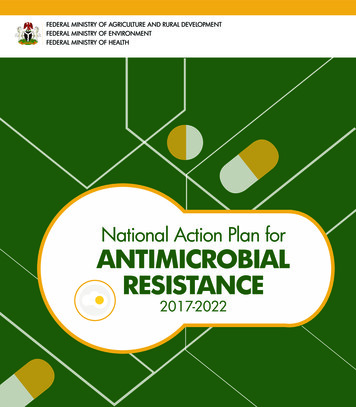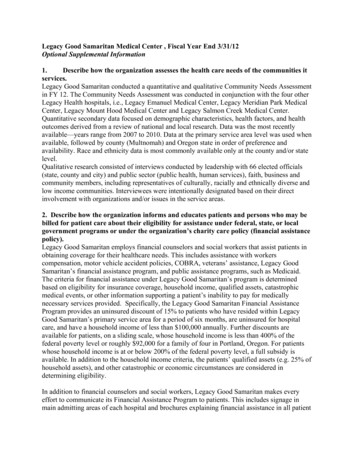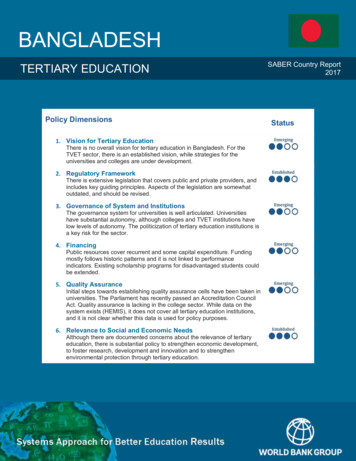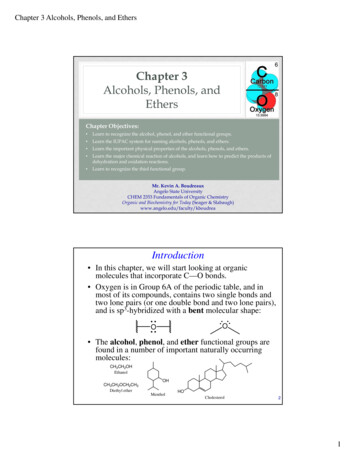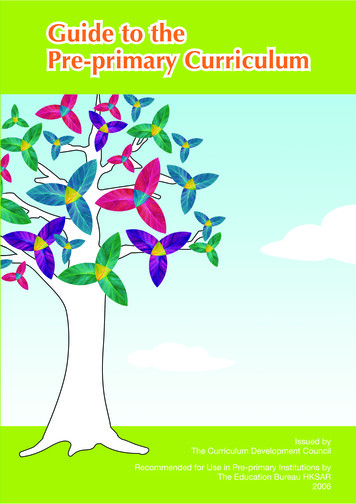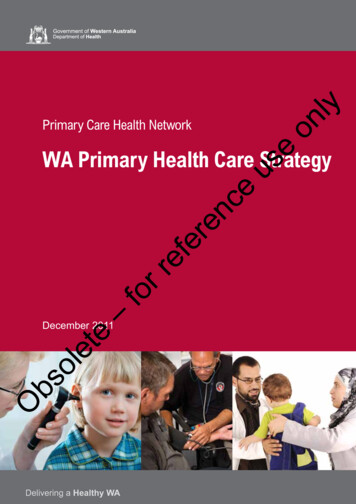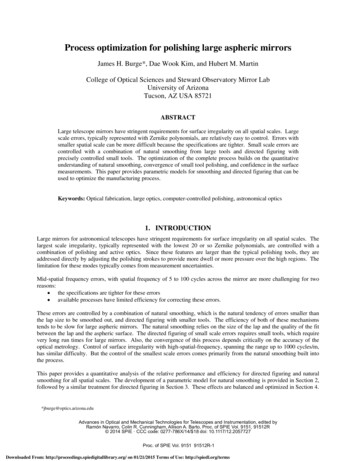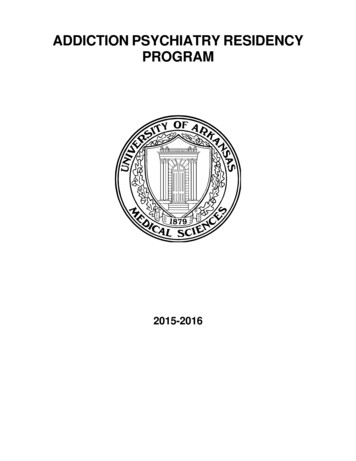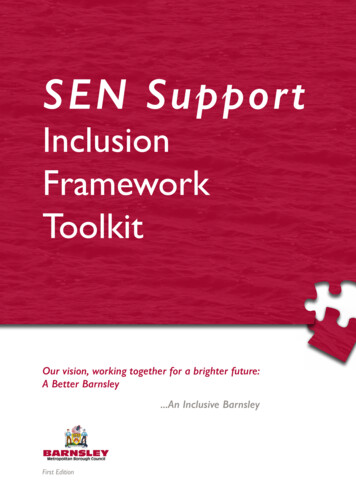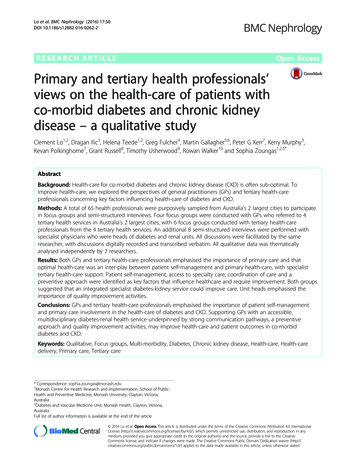
Transcription
Lo et al. BMC Nephrology (2016) 17:50DOI 10.1186/s12882-016-0262-2RESEARCH ARTICLEOpen AccessPrimary and tertiary health professionals’views on the health-care of patients withco-morbid diabetes and chronic kidneydisease – a qualitative studyClement Lo1,2, Dragan Ilic3, Helena Teede1,2, Greg Fulcher4, Martin Gallagher5,6, Peter G Kerr7, Kerry Murphy3,Kevan Polkinghorne7, Grant Russell8, Timothy Usherwood9, Rowan Walker10 and Sophia Zoungas1,2,5*AbstractBackground: Health-care for co-morbid diabetes and chronic kidney disease (CKD) is often sub-optimal. Toimprove health-care, we explored the perspectives of general practitioners (GPs) and tertiary health-careprofessionals concerning key factors influencing health-care of diabetes and CKD.Methods: A total of 65 health professionals were purposively sampled from Australia’s 2 largest cities to participatein focus groups and semi-structured interviews. Four focus groups were conducted with GPs who referred to 4tertiary health services in Australia’s 2 largest cities, with 6 focus groups conducted with tertiary health-careprofessionals from the 4 tertiary health services. An additional 8 semi-structured interviews were performed withspecialist physicians who were heads of diabetes and renal units. All discussions were facilitated by the sameresearcher, with discussions digitally recorded and transcribed verbatim. All qualitative data was thematicallyanalysed independently by 2 researchers.Results: Both GPs and tertiary health-care professionals emphasised the importance of primary care and thatoptimal health-care was an inter-play between patient self-management and primary health-care, with specialisttertiary health-care support. Patient self-management, access to specialty care, coordination of care and apreventive approach were identified as key factors that influence healthcare and require improvement. Both groupssuggested that an integrated specialist diabetes-kidney service could improve care. Unit heads emphasised theimportance of quality improvement activities.Conclusions: GPs and tertiary health-care professionals emphasised the importance of patient self-managementand primary care involvement in the health-care of diabetes and CKD. Supporting GPs with an accessible,multidisciplinary diabetes-renal health service underpinned by strong communication pathways, a preventiveapproach and quality improvement activities, may improve health-care and patient outcomes in co-morbiddiabetes and CKD.Keywords: Qualitative, Focus groups, Multi-morbidity, Diabetes, Chronic kidney disease, Health-care, Health-caredelivery, Primary care, Tertiary care* Correspondence: sophia.zoungas@monash.edu1Monash Centre for Health Research and Implementation, School of PublicHealth and Preventive Medicine, Monash University, Clayton, Victoria,Australia2Diabetes and Vascular Medicine Unit, Monash Health, Clayton, Victoria,AustraliaFull list of author information is available at the end of the article 2016 Lo et al. Open Access This article is distributed under the terms of the Creative Commons Attribution 4.0 InternationalLicense (http://creativecommons.org/licenses/by/4.0/), which permits unrestricted use, distribution, and reproduction in anymedium, provided you give appropriate credit to the original author(s) and the source, provide a link to the CreativeCommons license, and indicate if changes were made. The Creative Commons Public Domain Dedication waiver ) applies to the data made available in this article, unless otherwise stated.
Lo et al. BMC Nephrology (2016) 17:50BackgroundThe 2015 Global Burden of Disease Study report indicated that people are living longer but with more multimorbidity and increased disability [1, 2] predominantlydriven by chronic non-communicable diseases, includingdiabetes. Diabetes is a major cause of chronic diseasewith 8.3 % of adults, or 382 million people, estimated in2013 to be affected worldwide [3]. It is also the leadingcause of chronic kidney disease (CKD), accounting forup to 50 % of people who develop end-stage kidneydisease, and can co-exist with non-diabetic CKD [4].Multi-morbidity due to diabetes and CKD substantivelyincreases disability and mortality, especially due to cardiovascular disease [5]. The annual estimated Medicare feefor service costs for diabetes and CKD for those agedgreater than 65 years old has been estimated at 13.6 billionUSD in America in 2013 [6].There has been emerging evidence of suboptimal management of co-morbid diabetes and CKD with commonproblems including the failure to identify renal diseaseresulting in inappropriate usage and dosage of medications, adverse medication effects [7–10], and delayed referral to specialists [11]. Other problems include thefailure to meet clinical performance parameters such asblood pressure [8] and glycaemic targets [12], the lack ofappropriate use of angiotensin blockade agents and statins[8], and poor screening of cardiovascular risk factors [12]and diabetic complications [8, 12].This may reflect the outcomes of health systems poorlyequipped to deal with and manage multi-morbidity ingeneral [2] and co-morbidity due to diabetes and CKDspecifically. People with multi-morbidity require a broaderapproach than the individual chronic disease focus whichconfigures the delivery of most health-care systems anddominates research globally [2, 13]. Additionally, whilepeople with co-morbid diabetes and CKD emphasise theimportance of self-management, disease related adverseexperiences due to co-morbidity, especially in later stagesof CKD (such as tiredness, feeling unwell and increaseddisability) and the related psychological sequelae can hinder self-management [14], and should be recognised andaddressed in health service delivery.Given multi-morbidity is likely to become an increasing challenge as health-systems serve an aging population with more chronic diseases [1, 2], research targetinghealth-care improvement for multi-morbidity, such asco-morbid diabetes and CKD, should be a priority.While previous research has mainly taken a deductiveapproach testing a model of health delivery [10, 15, 16]there has been a paucity of research adopting an inductive and formative approach exploring the ideasand priorities of people involved in delivering or receiving health-care for co-morbid diabetes and chronickidney disease.Page 2 of 12In Australia, most specialist ambulatory health-care isprovided free at government-funded public hospitals orsubsidised by the government through a universal healthcare scheme called Medicare. In this setting, generalpractitioners (GPs) are the gateway to tertiary healthcare or specialist health professionals and allied healthprofessionals with GP referrals required to access specialist tertiary health-care and allied health-care. As suchthe majority of the health-care of patients with comorbid diabetes and CKD is provided by primary (GPs)and tertiary health-care professionals.In this qualitative study, we explored how the healthcare of patients with co-morbid diabetes and CKD can beimproved by examining the perceptions of primary and tertiary health-care professionals concerning the key factorsinfluencing optimal health-care for this patient population.MethodsThis qualitative study was a research collaboration between 4 large tertiary health services across 2 of Australia’slargest cities, 2 research institutes (Monash Centre forHealth Research and Implementation and The GeorgeInstitute for Global Health) and 2 national consumerstakeholder groups (Diabetes Australia and Kidney HealthAustralia). The study was underpinned by a pragmaticworldview [17], whereby the emphasis is using availableeffective methods to explore and find a solution to aresearch problem, rather than fidelity to a single system ofphilosophy and reality [18].We utilised focus groups of GPs and tertiary health-careprofessionals (excluding specialist unit heads) to explore awide range of issues and perspectives, which is less likelyto occur in a semi-structured interview dynamic [19, 20].Separate focus groups were held for tertiary health-careprofessionals working at each tertiary health service(Alfred Health, Concord Hospital, Monash Health and theRoyal North Shore Hospital) and for GPs working in thehealth region of each tertiary health service, ensuring thatGPs and tertiary health professionals did not influenceeach other’s views. Additionally, specialist physicians whowere diabetes and renal unit heads from each tertiaryhealth service participated in semi-structured interviewsseparate from the focus groups, ensuring that tertiaryhealth professionals could share their perspectives in anunhindered manner and allowing triangulation or crossreferencing of results with findings of the focus groups.The study was approved by all local hospital and universityHuman Research Ethics Committees (Monash Health Human Research Ethics Committee, Alfred Health ResearchEthics Committee, Monash University Human ResearchEthics Committee, Northern Sydney Local Health DistrictHuman Research Ethics Committee, Sydney Local HealthDistrict Human Research Ethics Committee and theUniversity of Sydney Human Research Ethics Committee).
Lo et al. BMC Nephrology (2016) 17:50Page 3 of 12Participant selection and settingData analysisGPs were recruited from the health regions associatedwith the 4 tertiary health services. We sought to recruita representative sample of GPs by faxing a letter of invitation to all GP clinics in the 4 regions (598 GPs)followed up by phone calls. Respondents to the fax and/or phone call attended focus groups in each region.Tertiary health professionals from 4 tertiary health-careservices in 2 of Australia’s most populous cities (Alfredand Monash Health in Melbourne, and Royal North Shoreand Concord Hospitals in Sydney) were purposivelysampled based on each diabetes and renal unit’s headphysician’s knowledge and network of informationrich cases. Fifty-one tertiary health professionals wereapproached by an independent research assistant or a researcher (CL) and 35 were able to participate. Maximalvariation sampling ensured representation of endocrine,renal and allied health professionals [20]. Physicians whowere the diabetes and renal unit heads in each hospitalwere also recruited for semi-structured interviews. Allwho were contacted (8 in total), agreed to participate.Participants were assured of the de-identification andconfidentiality of all data and participated voluntarilyand gave written consent for participation in and audiorecording of focus groups. Participants who were GPswere remunerated as per standard health service approaches in Australia however specialists were not remunerated. Focus groups were conducted in a meetingroom at the main hospital of each tertiary health-service.Semi-structured interviews were conducted in the officeof the diabetes or renal unit’s head physician.Data analysis was an iterative process from the initiationof data collection to the study’s end. CL kept a reflexivejournal, recording entries after each focus group andinterview to check for potential biases as a clinician/researcher and to identify recurring thoughts and ideasfrom discussions. Transcripts were manually analysedindependently by two researchers (CL and KM, an experienced qualitative researcher) using a generic inductivethematic approach as described by Patton [19] andHarding [21]. After immersion into the data by iterativelyreading the transcripts, the researchers identified primarypatterns and coded the data in a constant comparativemanner, with cross-referencing made to notes from CL’sreflexive journal. The codes were then categorised intothemes [19, 21, 22]. Consensus concerning the emergingthemes was then reached between the two researchers(CL and KM) with any conflicts resolved through discussion with a third researcher (DI).Data collectionOpen ended discussion questions for both focus groupsand semi-structured interviews (Additional file 1: Table S1)were developed after a literature review (of health-careof co-morbid diabetes and chronic kidney disease) inconsultation with the research team and piloted as asemi-structured interview with 4 Endocrinologists fromMonash Health. An iterative approach was used withadditional questions added according to themes raisedin preceding focus groups and semi-structured interviews. Focus group and semi-structured interviewswere conducted and digitally audio recorded by thesame researcher (CL, a male Endocrinologist, withtraining and experience in conducting focus groups andsemi-structured interviews) from May 2013 to February2014. Focus groups and semi-structured interviewswere conducted until a point of data saturation wasreached, with no new ideas emerging. This occurredafter conducting 10 focus groups and 8 semi-structuredinterviews with a total of 65 participants. De-identifiedaudiotaped discussions were transcribed verbatim by anindependent transcribing service.ResultsA total of 65 primary and tertiary health professionalsparticipated in 10 focus groups and 8 semi-structuredinterviews. The composition of the focus groups anddemographic characteristics of participants is providedin Tables 1 and 2. No single health professional dominatedfocus groups discussions, with all participants contributing, although one allied health participant in one groupwas less contributory.Four key factors were considered by all participants(including tertiary health professionals, heads of unitsand GPs) to influence health-care of co-morbid diabetesand CKD including self-management, access, coordination and integration of care, and a reactive approach tohealth-care (Table 3). An additional key factor (qualityimprovement activities) was identified through interviewswith physicians who were the heads of unit. Managementof diabetes and CKD was perceived to be an interactionbetween patient self- management and GP or primarycare management, with ancillary specialist hospital ortertiary health-care management. A thematic schemaillustrating the interplay between each factor is shownin Fig. 1. Further variation in themes according to healthTable 1 Characteristics of general practitioner focus groupsHealth region focusgroup (FG)Mean age range(intervals of 10 years)Male (Female)GP FG 1 GP FG 2 GP FG 3 GP FG 4 All50–6060–7050–6050–6050–606 (0)6 (0)4 (0)4 (2)20 (2)Solo practice (n)03205Number of participants664622
Lo et al. BMC Nephrology (2016) 17:50Page 4 of 12Table 2 Characteristics of tertiary health professional focus groupsFocus groupHospitalHealth professionals involved (n)Gender (n) of involvedhealth professionalsMale: Female ratiofor the entire groupTotal (n)THP FG 1Hospital AEndocrinologists (2)Female (2)1:78Nephrologists (2)Male (1); Female (1)Diabetes nurse practitioner (1)Female (1)Diabetes nurse educator (1)Female (1)Renal nurse practitioners (2)Female (2)THP FG 2Hospital ASocial Workers (3)Male (1), Female (2)1:23THP FG 3Hospital BEndocrinologist (1),Female (1)3:361:561:562:459:2635THP FG 4THP FG 5THP FG 6Hospital CHospital DHospital DNephrologists (2),Male (2)Diabetes nurse educator (1),Female (1)Renal nurse (1),Female (1)Dietician (1),Female (1)Social worker (1)Male (1)Endocrinologist (1)Female (1)Endocrine advanced trainee (1)Female (1)Diabetes nurse practitioner (1)Female (1)Renal nurse practitioner (1)Female (1)Dietician (1)Female (1)Nephrologist (1)Male (1)Nephrologist (1)Male (1)Renal advanced trainee (1)Female (1)Renal nurses (2)Female (2)Dietician (1)Female (1)Diabetes nurse practitioner (1)Female (1)Diabetes nurse educators (2),Female (2)Endocrine advanced trainees (4).Male (2), Female (2)TotalN/Aprofessional grouping (e.g. physician, nurse and alliedhealth staff ) were not apparent.Self-managementTable 3 Key factors seen to influence health-care of co-morbiddiabetes and CKDParticipant subgroupKey factorsAll participants (including tertiary healthprofessionals, heads of units and GPs)Heads of cess to specialist health-careCoordination and integration of carei) GP as the primary coordinator of careii) Poor coordination of care andiii) Poor communication betweenhealth-care providersReactive approach to healthAll health professionals thought that self-managementby patients of co-morbid diabetes and CKD was essentialfor optimal health-care. Both GPs and tertiary healthprofessionals felt that some patients relied on healthprofessionals to manage their co-morbid diabetes andCKD instead of taking ownership and responsibility fortheir condition and self-managing.“Sometimes ( ) patients remove themselves from anylevel of responsibility for their care.” – THP FG 5Several factors were purported to influence patients’ability to self-manage. These included their understanding of illness, education, social factors (including cultureand language), financial situation, psychological factors
Lo et al. BMC Nephrology (2016) 17:50Page 5 of 12Fig. 1 Thematic Schema illustrating health professionals’ views on factors influencing the health-care of co-morbid diabetes and chronic kidney diseaseand co-morbidities, and their physical/mental aptitude.Health professionals emphasised the importance of patients’ understanding of diabetes and co-morbid CKD,its treatment, and its complications in promoting selfmanagement, such as self-monitoring of blood glucose,taking medications and making dietary and lifestylemodifications.“I think that a lot of patients just simply do not realisethe enormity of their condition. For some of them, theythink its just a little bit of sugar.( ) They don’tassociate diabetes with blindness ( ) with CKD. Theydon’t associate diabetes with peripheral arterialdisease, amputations etc. They just don’t appreaciate– and maybe some us might not either. They justdon’t appreciate how dire their disease can be ifthey don’t look after themselves as well as theyshould”. – GP FG 2Most GPs and tertiary health professionals thought thatpatient self-management could be improved through education to improve patient understanding of co-morbiddiabetes and CKD and better communication of medicalinformation. Tertiary health professionals suggested thateducation and communication could be more patientcentred for example simpler, non-condescending, in thenative language, culturally relevant, address incorrect beliefs of disease, and involve motivational interviewing/behavioural change/health coaching. They recommendedthat education be given early in the disease and also provided to family members. Additionally, GPs suggested thatself-management could be fostered by giving patients acopy of their chronic care plan with treatment targets,current results and medical/allied health appointments.Access to tertiary health-careAccess to specialist tertiary health-care was consideredto be challenging for both patients and other health professionals wanting advice.For patients, tertiary health professionals thought thataccess to health-care for co-morbid diabetes and CKDcould be difficult due to tertiary health-care being centralised in large hospitals, the lack of available appointments, long waiting times in clinic, the cost of travellingand medications, the time involved in treatment and thetiming of treatment.
Lo et al. BMC Nephrology (2016) 17:50“( ) for many people, coming into the hospital clinic,it is overwhelming in itself. It’s difficult to park, it’sdifficult to get to, it’s busy.” - THP FG 1Similarly, all GPs complained about the long waitingtimes for initial patient reviews by specialist tertiaryhealth-care diabetes or renal clinics or allied healthservices (frequently months) and the long waiting roomtimes for patients.“They’re going to get a letter and they’re going to sayin two weeks’ time you have an appointment in ourclinic, but make sure you’re there half an hour early,but dedicate the whole afternoon because you may notleave until 5 pm. That’s what they get, so they take acut lunch and thermos”. – GP FG 3Both tertiary health professionals and GPs agreed thataccess to tertiary health-care advice for health professionals was problematic. They reported that referral processes were difficult, complicated and tedious. GPs wereoften unsure if their referrals had been received andwhat the waiting times before review would be. Othersindicated wanting more information about the specialisttertiary health-care services offered by hospitals and being unsure about referral guidelines and pathways to thediabetes or renal clinics.“There’s no actual easy centralised process where wecan make referrals”. – THP FG 4GPs reported difficulty clarifying management decisionsmade during tertiary health-care clinics through phonecalls and frustration that calls were either not returned orreturned after a long delay.“That sort of bureaucratic interface which oftendoesn’t work, and it’s not often the clinics, it’s thelarger hospital administrative interface where justtrying to get through to talk to somebody rather thanan answering machine and getting someone to comeback to you and trying to convey a sense of urgency”. –GP FG 4Conversely, most heads of units thought that their services provided access to good quality, individualised,patient-centred care at a low cost (since this was coveredby the government).All GPs and tertiary health professionals agreed thatthere was insufficient access to tertiary health-care levelallied health (especially dietetics, psychology, social work,podiatry, and in some cases even diabetes education) andophthalmology services. Most GPs found accessing alliedhealth and diabetes nurse educator services from tertiaryPage 6 of 12health-care services frustrating. They felt that tertiaryhealth-care services were generally unwilling to offer alliedhealth services to patients referred by GPs.Both GPs and tertiary health professionals felt that access to specialist tertiary health-care services could beimproved by a health professional triaging referrals andacting as a point of phone contact for referring GPs andother tertiary health professionals. This would facilitatephone consultations about potential referrals, and clarification of treatment decisions made in specialist tertiaryhealth-care clinics. They also suggested that the referralprocess could be simplified with greater clarity surrounding referral criteria, and improved communicationconcerning reception of the referral and waiting-timesprior to clinic review.Decentralising tertiary health-care services to the community could improve access. Some GP and tertiary healthprofessionals suggested that outreach clinics could be located in community centres serviced by GPs with an interest in managing diabetes and CKD, with specialistphysicians having a supportive and educational role. Thiswould not only foster better relationships and communication between tertiary health professionals and GPs, butupskill GPs in managing diabetes and CKD.Coordination and integration of careThree sub-themes are covered by the larger theme of coordination and integration of care. These are 1) the GPas the coordinator of care 2) poor coordination of careacross tertiary and primary health-care 3) poor communication across tertiary and primary health-careThe GP as the coordinator of careA major sub-theme emerging was the role of the GP asthe coordinator of care for patients with co-morbid diabetes and CKD, with specialist services playing an ancillaryrole. While both GPs and tertiary health-care professionalsgenerally agreed with this in principle, there were severalbarriers to this that were expressed.First, there was distrust between tertiary health professionals and GPs. Many tertiary health professionalsthought that GPs lacked expertise and required moreeducation in managing diabetes and CKD to prevent inappropriate management. They thought that GPs eitherover-referred or didn’t prioritise managing diabetes andpreventing complications, resulting in late referrals totertiary health-care. This resulted in many tertiary healthcare services coordinating the care of patients instead ofrelying on the GP.“I think because diabetes is so complex in terms of itbeing managed by poly pharmacy that that’s verydifficult for the – yeah, I think that’s very difficult forGPs to do really well. And it’s important that people
Lo et al. BMC Nephrology (2016) 17:50are medically managed ( ) very well [so] we [can]help achieve good control also when you put kidneydisease into the background then a lot of the diabetesmedications need to be reviewed. I think that’sproblematic. And the difficulty too with the GPstarting someone on insulin is huge, because theydon’t have anyone out there to help them do it” –THP FG 5On the other hand, GPs noted that tertiary health services would often takeover the diabetes and CKD care oftheir patients. They felt that tertiary services were dismissive of their roles as the primary coordinator of care andunfairly under-estimated the expertise and willingness ofGPs to manage diabetes and CKD due to previous poorexperience with other GPs.“And you do get judged by your lowest commondenominator ( ) you only need one or two badstories and then that sets a reputation within thesystem that ‘We don’t trust GPs’ or ‘GPs don’t dothis well’”. – GP FG 4Many thought that some tertiary services performedprimary care roles such as coordinating patient care ormanaging simple, early diabetes and CKD.Second, tertiary health professionals reported difficultywhen patients did not have a regular GP or had very little contact with their GP. One possible reason cited byhealth professionals was that some patients had so manymedical appointments (including dialysis) due to theirmulti-morbidity that they could not maintain contactwith their GP.In order to facilitate GPs being the primary coordinator of care for co-morbid diabetes and CKD, both GPsand tertiary health professionals recommended greaterrole clarification and collaboration and education andupskilling of GPs in the management of and indicationsfor specialist referral of co-morbid diabetes and CKD.GPs suggested that this could be achieved through obligatory training on diabetes and CKD supported by financial incentives; better dissemination of standardiseddiabetes and CKD health-care guidelines; secondment tospecialist diabetes and/or CKD clinics; and attendance atDiabetes and Renal Unit meetings. GPs also suggestedthat they should be encouraged to manage chronic diseases more (such as diabetes and CKD) through financial incentives.Poor coordination and integration of health-careThe second sub-theme raised by both GPs and tertiaryhealth professionals, was poor coordination of careacross primary and tertiary health-care. Tertiary healthprofessionals described health-care at the tertiary levelPage 7 of 12as siloed and fragmented into different specialties. BothGPs and tertiary health professionals reported an insufficient level of integration of care between tertiary andprimary levels of care. They associated poor coordination of care with a lack of coordination of appointments for patients, and a lack of clarification of rolesresulting in duplication of tests and treatment, conditions being left untreated (due to the erroneous assumption that another health professional would manage thecondition), conflicting messages given to patients, andfrequent multiple changes in treatment.“Sometimes patients get completely confused becauseyou’ve made one change, someone’s made the otherchange and sometimes you don’t know who’s makingthe change ( ) the communication about who is doingwhat management is not clear.” – THP FG 1“Often I’ll send them in with all their blood tests andthey’ll immediately do another set at the hospital”. –GP FG1Most GPs and tertiary health professionals suggestedthat coordination and integration of health-care for comorbid diabetes and CKD could be improved through amultidisciplinary diabetes and renal specialist servicewhich would combine several specialty appointmentsinto one visit, improving integration of care and decreasing the number of clinic appointments for patients. Tertiary health professionals spoke about this in depth,suggesting that the clinic could offer structured care andbe staffed by endocrinologists, nephrologists, socialworkers, dieticians, diabetes and renal nurses and psychologists, with other staff such as podiatrists, ophthalmologists, pharmacists, and vascular surgeons beinginvolved on an on-call basis. Both GPs and tertiary healthprofessionals saw 2 roles for such a clinic – 1) chronic disease management support for those with diabetes andCKD and a complex medical/social history such as thoseon dialysis or with a kidney transplant 2) crisis supportand a consultative service for patients which GPs hadtrouble managing. However, some GPs cited logistical difficulties in implementation of such a clinic or the clinichaving too narrow a focus.To improve coordination of care and clarification ofroles, especially between primary and tertiary health-care,many GPs and tertiary health professionals proposed astructured shared care pathway or care plan outliningmanagement goals, with agreed predefined roles for theGP and the specialist physicians and schedule of appointments with involved health professionals, individualised tothe patient’s severity of co-morbid diabetes and CKD.They also suggested multidisciplinary case conferencingfor difficult patients.
Lo et al. BMC Nephrology (2016) 17:50Poor communication between health-care providersAll participants highlighted the importance of effectivecommunication of medical information between healthproviders (including specialist physicians, GPs and providers of pathology or radiology services). However, theyperceived communication to be often poor between andwithin all levels of care, contributing to poor coordinationof care.Tertiary health professionals and GPs complainedabout poor communication of referrals, manage
care scheme called Medicare. In this setting, general practitioners (GPs) are the gateway to tertiary health-care or specialist health professionals and allied health professionals with GP referrals required to access spe-cialist tertiary health-care and allied health-care. As such the majority of the health-care of patients with co-
